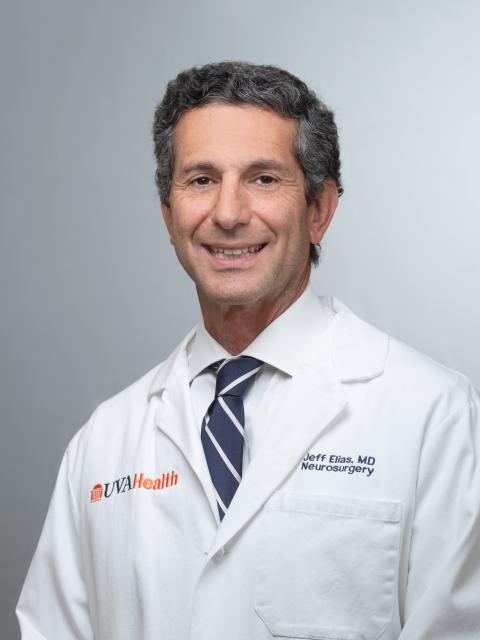
William J Elias, MD
Neurosurgery
Additional Locations
Bio & Overview
William ‘Jeff’ Elias grew up in Roanoke, Virginia as the son of a neurologist where he developed his curiosity for the field of medicine. He graduated Phi Beta Kappa from Wake Forest University with a Bachelor of Arts degree in chemistry. He attended the University of Virginia for medical school and neurosurgical residency training. During neurosurgical training, he completed intramural fellowships in neuropathology and spinal surgery before spending a year in Plymouth, England as a senior registrar. Following residency, he pursued additional training in stereotactic and functional neurosurgery at the Oregon Health Sciences University.
In 2002, Dr. Elias returned to the University of Virginia where he currently serves as the Director of Stereotactic and Functional Neurosurgery with a large multidisciplinary program in the surgical treatment of movement disorders, epilepsy and pain conditions. He currently serves on the medical advisory board for the International Essential Tremor Foundation (IETF). Dr. Elias’ clinical team includes Shelly Rush-Evans, ACNP, Kathy Maynard, RN, and Karen Osteen.
Scientifically, Dr. Elias is pursuing research projects that match his clinical interests in movement disorders and pain interventions. His clinical research involves the use of MR-guided focused ultrasound for the treatment of movement disorders such as essential tremor and Parkinson's disease. His success in pioneering the first focused ultrasound clinical trial for essential tremor led to FDA approval and served as a launching point for continued image-guided investigations involving the use of laser interstitial thermal therapy and MRI-guided deep brain stimulation. In 2018, he was awarded UVA’s Innovator of the Year. More recently, he is investigating new interventions for chronic pain conditions including focused ultrasound for cancer pain and neuromodulation of the insula for neuropathic pain. Dr. Elias has been awarded several grants from the National Institute for Health (NIH) for his ongoing research.
Academically, Dr. Elias served on the editorial board of the Journal of Neurosurgery and was awarded the position of the John A. Jane Professor of Neurological Surgery. His research has been published in over a hundred journals including the New England Journal of Medicine and JAMA.
Academic Information
- Department
- Neurosurgery
- Academic Role
- Professor
- Division
- Neurosurgery-Cranial
- Research Interests
- Focused Ultrasound for Essential Tremor, Parkinson's, Epilepsy, and other conditions. Focused ultrasound for neuromodulation and brain mapping. Image-guided brain surgery.
Conditions & Treatments
- Carpal tunnel syndrome surgery
- Cordotomy
- Deep brain stimulation
- Epilepsy
- Epilepsy surgery
- Epilepsy surgery evaluation
- Essential tremor
- Evaluation for deep brain stimulation (dbs)
- Focal dystonia
- Focused ultrasound
- Functional neurologic disorder
- Movement disorders
- Neurocutaneous syndromes
- Parkinson's disease (pd) surgery
- Rhizotomy surgery of trigeminal nerve pain
- Spinal cord stimulator
- Surgery for spasticity
- Thalamotomy
- Tourette syndrome
- Trigeminal neuralgia
- Vagal nerve stimulator
- Gender
- Male
- Languages
- English
- Age Groups Seen
- Adults (21-65)
Older Adults (65+)
- Primary Education
- University of Virginia School of Medicine
- Residency
- University of Virginia Medical Center
- Certification
- American Board of Neurological Surgery (Neurological Surgery)
Highlights
Dr. Jeff Elias profile video
JEFF ELIAS: I'm Jeff Elias. I'm a professor of neurosurgery at the University of Virginia. Here at the University of Virginia, we have real expertise in stereotactic and functional neurosurgery. And what that means, really, is delivering treatments precisely into the brain are usually deep into the brain. Brain stimulation or lesioning for Parkinson's disease or epilepsy or tremors, usually we can treat areas of the brain that are abnormal and restore them towards normalcy. I'm very interested in research or clinical research, bringing new treatments to the clinic for patients. And one of the areas that I'm particularly interested in is focused ultrasound technology. That involves focusing ultrasound beams through the skull to treat areas of the brain, without any incisions or openings in the skull. And so far, initial experience with that has been very positive and successful. We see patients with chronic neurologic diseases, and they can often be very complex. There's no one person that can solve any of these problems. So I think when we bring an entire team approach to the problem, we're really able to look at it more broadly and bring a better treatment program to the patient. We really care about them. And we'll do whatever we can do to try to help them. We can't necessarily cure everything, but we're here to try to help in the best way that we can.
Awards
- 2009-2020 Best Doctors in America® List
- 2018 Best Bedside Manner Awards, OurHealth Charlottesville and Shenandoah Valley Magazine; Second Place, Surgery: Neurosurgery
- 2002 School of Medicine’s Excellence in Clinical Medicine Award
Reviews
177 Patient Satisfaction Ratings
Our patient satisfaction ratings are an average of all the survey responses to the below questions a provider got within the past 2 years. To protect your privacy, patients aren't identified.
See more about our patient satisfaction surveys .